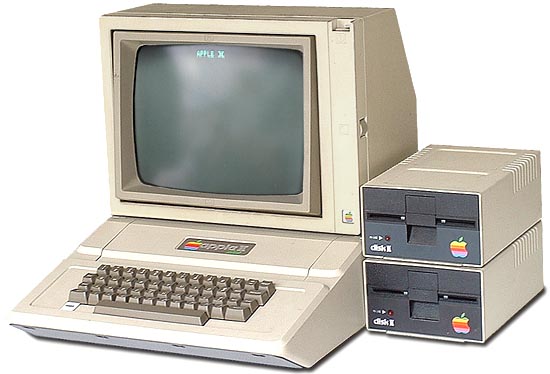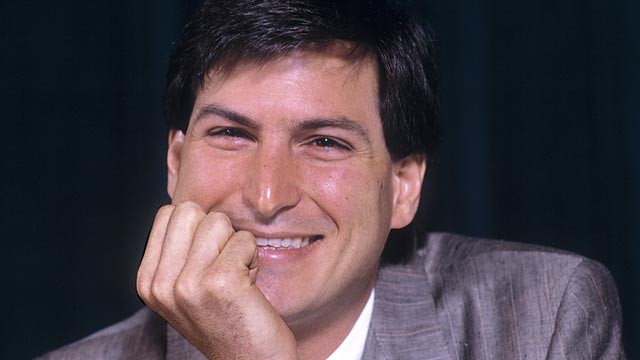Steve Jobs - "The Grandfather of Cool"
It is the morning of October 6th, 2011 and waking up the day after Steve Jobs' passing I can't help but to notice that being a lifelong computer nerd suddenly feels a bit empty - less prideful - a bit less... cool.
I began programming as a seven-year-old on an Apple II computer in 1977. I had very little idea what a computer was at the time, but my cousin Glenn - whom I had never met - worked at Apple Computer and was flying out to Chicago to bring the latest and greatest new thing right to my Uncle Wayne's house. And I just happened to be hanging around when it happened. Yes, getting a personal computer back then happened to you. And it did me.
 I don't know what he intended to do with a computer, or why he even bought it in the first place; but it didn't matter because he could never get in front of it with me around. I had no idea what I was supposed to do with this "thing" either but I couldn't escape the inexplicable force which drew me to it. Flip a switch, push a button, turn a knob - do anything with it and just see what happens. Where is that noise coming from? What does it look like inside? How do you make it go?
I don't know what he intended to do with a computer, or why he even bought it in the first place; but it didn't matter because he could never get in front of it with me around. I had no idea what I was supposed to do with this "thing" either but I couldn't escape the inexplicable force which drew me to it. Flip a switch, push a button, turn a knob - do anything with it and just see what happens. Where is that noise coming from? What does it look like inside? How do you make it go?
I began tearing through manuals as if my life depended on it. I blazed through the typical first programs of making it beep and writing my name on the screen, each time creating more of my own problems to solve. I was flying blind but thriving on the challenge of man versus machine, and I began having dreams of writing games that finally would allow me to beat my dad instead of getting whooped at Space Invaders in the arcades. And soon, family and friends were marveling at how "this little boy" could make that crazy contraption do tricks. It was cool.
After a few years of burying myself in voluntary learning (although people invariably referred to it as "playing with computers") I started to sense that there was not only unimaginable potential in being able to make these machines obey commands, but that there was a style to it; a personality to the impersonal computer - a closing of the gap between man and machine. All home computers were all just a pile of bits, but some had smiling faces. And as the world wandered through the fog using cloned PC computers we all knew in the back of our minds that the two guys in the garage were really "it" - that they were the leaders you may have loved to hate, but the rest of the pack were the followers. Even in their worst of times, Apple was the blazing torch of ingenuity shining through a sea of beige robots, and it was all due to the perseverance and genius of visionary Steve Jobs.
Through high school and beyond, the rest of society started catching up and the image of the greasy, pencil-necked computer geek gave way to the more social and personable "War Games" computer nerd. Making bits fly was suddenly... cool. Being a computer hacker - which we all were, since there were still no formal schools or programs to teach you this stuff yet - was now a lifestyle. It was already "too late" for people to jump your train and out-nerd you. If your peers, now in their late teens, hadn't sat for half their life in a basement typing the same forty-character lines of code six different ways until three in the morning, it was too late. The horses were out of the barn.
If you were one of the true computer nerds you paid your dues, and it showed; people started comparing you to either Bill Gates, who finished (enough of) his revolutionary DOS code literally on the flight to the demonstration, or to "those two guys" who invented a wooden plank of circuits in their garage and changed the world. Bill Gates and Steve Wozniak were super-geeks with the rimmed glasses or the gawky demeanor; but the more you heard about this "Steve Jobs" character the more you knew you were supposed to be like him. Or perhaps you already were.
 Maybe that's a great way to sum up how revolutionary an individual Steve was? There are hundreds of notable figures in the history of computers from Charles Babbage and Ada Lovelace to the likes of Marc Andreessen, Larry Ellison or Bill Gates. We aspiring young technologists always wanted to do what they did but I'm not sure we ever wanted to be who they were. With Steve it was different. It was... cool.
Maybe that's a great way to sum up how revolutionary an individual Steve was? There are hundreds of notable figures in the history of computers from Charles Babbage and Ada Lovelace to the likes of Marc Andreessen, Larry Ellison or Bill Gates. We aspiring young technologists always wanted to do what they did but I'm not sure we ever wanted to be who they were. With Steve it was different. It was... cool.
I haven't spent more than a few minutes thinking about Steve at any one time throughout my entire career. But in the twelve short hours since his passing, the fog has crept back in. Suddenly, being that computer nerd is less cool again. Suddenly there's something missing. Suddenly there's a gap.
Could it have been that Steve, directly or indirectly, was pulling the entire community – and industry – in a direction that mattered? Was his mere presence enough to give pause to executives everywhere, to influence their decision making in a positive direction? Will this continue, now that he is gone?
Steve lived a robust life but died way too early. Although he was too young for the moniker, he was the “Grandfather of Cool” and his impact went far beyond how we purchase music or click an icon. We in the technology sector - and society at large - owe him a great deal more than we will ever realize.
We will miss him dearly.
Would you like to send me an email regarding this article?
Comments on this article:
Thanks for the post
Submitted by Eric Nelson on Fri, 10/07/2011 - 11:55.Superbly well written... lots of good humor, compassion, sincerity... an excellent tribute to Steve!
Thank you for the positive comment!
Submitted by Todd Young on Fri, 10/07/2011 - 21:21.Thank you for the positive comment! I am glad to have this chance to say thanks to someone who I hadn't realized had a very indirect but monumental influence on my life trajectory.
(Comments are now closed on this article)